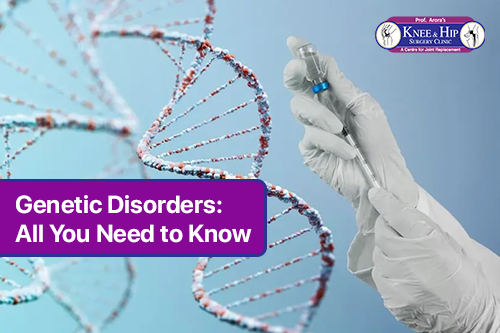
Genetic disorders are health problems that happen when there’s a change or error in a person’s DNA—the instructions that guide how our bodies grow and work. Some of these conditions are passed down from parents, while others can appear suddenly, even if no one in the family has had them before. Their effects can be as mild as small health issues or as serious as lifelong challenges that need care from different medical experts.
In this guide, we’ll break down the causes, types, diagnosis, and treatment options for genetic disorders—giving you and your family clear information and support every step of the way.
What are genetic disorders?
Genetic disorders happen when there’s a change or mistake in your genes or when your body has too much or too little genetic material. Genes are like tiny instruction manuals made of DNA—they guide how your body works and help shape the traits that make you who you are.
You inherit half of your genes from each parent. Sometimes, a gene can have an error, either inherited or developed on its own. These changes, called mutations, can increase your chances of developing a genetic condition. Some of these conditions are noticeable at birth, while others may not show up until later in life.
There are different types of genetic disorders:
- Chromosomal disorders happen when parts of your chromosomes—structures that carry your genes—are missing, extra, or rearranged.
- Complex (or multifactorial) disorders are caused by a mix of gene changes and lifestyle or environmental factors, like diet, pollution, or smoking.
- Single-gene (monogenic) disorders occur due to a mutation in just one gene.
What are common genetic disorders?
There are many different kinds of genetic disorders, and they can be grouped into a few main categories:
Chromosomal disorders
- Down syndrome (also called Trisomy 21)
- Fragile X syndrome
- Klinefelter syndrome
- Triple-X syndrome
- Turner syndrome
- Trisomy 18
- Trisomy 13
Multifactorial disorders
- Alzheimer’s disease (usually appearing later in life)
- Arthritis
- Autism spectrum disorder (in most cases)
- Many types of cancer
- Coronary artery disease
- Diabetes
- Migraine headaches
- Spina bifida
- Certain types of heart defects present at birth
Monogenic disorders
- Cystic fibrosis
- Congenital deafness (deafness present at birth)
- Duchenne muscular dystrophy
- Familial hypercholesterolemia (a type of inherited high cholesterol)
- Hemochromatosis (too much iron in the body)
- Neurofibromatosis type 1 (NF1)
- Sickle cell disease
- Tay-Sachs disease
Contact with Dr. (Prof.) Anil Arora
 1.png)
Dr. (Prof) Anil Arora
Vice Chairman & Head of Department Orthopaedics & Joint Replacement Surgery, Max Super Speciality Hospital, Patparganj, Delhi
Chairman & Chief Surgeon, Prof. Arora's Knee & Hip Surgery Clinics, NCR
Education & Training:
- DNB in Orthopaedics from National Board of Examinations
- MS in Orthopaedics from Dr. SN Medical College, Jodhpur
Hospital: Max Super Specialty Hospital
Clinic: Prof. Arora’s Knee & Hip Surgery Clinics, Delhi NCR
Experience: 33+ Years
- Commonwealth Academic Staff Fellowship in Primary, Complex & Revision Joint Replacement Surgery: Royal National Orthopaedic Hospital - Stanmore, London (UK)
- Professor at University College of Medical Sciences & GTB Hospital, New Delhi
- Assistant Professor at Dr SN Medical College & Mahatma Gandhi Hospital, Jodhpur
- Senior Resident at University College of Medical Sciences & GTB Hospital, New Delhi
Specialty: Orthopaedic Joint Replacement (Robotic Knee & Hip Replacement) Max Super Specialty Hospital
About: Dr. (Prof.) Anil Arora, Guinness world record holder and Limca book of records holder, is a Senior Robotic Total Knee & Hip Replacement surgeon. He is an Internationally known figure in Orthopedics and joint replacement. He has been performing joint replacements since 1988, experience of more than 33 years and 12,000 Knee & Hip Replacement surgeries. Teaching in medical college and training Orthopedic surgeons has provided him with vast surgical and clinical experience and expertise. He has wide-ranging skills in knee and hip replacement surgeries. He is known for his sound clinical judgment and fine surgical skills. He was the first surgeon to start pinless computer navigated total knee replacements in north India. He is regularly performing primary, complex and revision (Robotic & pinless computer navigated) knee and hip replacement surgeries. He is also performing primary and revision elbow and shoulder replacements. He is the immediate past president of Delhi Orthopedic association.
Are there other types of genetic disorders?
Yes, genetic disorders can also cause rare diseases. These are conditions that affect a small number of people—fewer than 200,000 in the U.S. alone. In fact, experts believe there could be as many as 7,000 different rare genetic diseases.
Some examples of rare genetic disorders include:
- AA amyloidosis
- Adrenoleukodystrophy (ALD)
- Ehlers-Danlos syndrome
- Mitochondrial diseases
- Usher syndrome
Symptoms and Causes
What causes genetic disorders?
To understand what causes genetic disorders, it helps to first know a bit about how your genes and DNA work. Most of your DNA carries instructions for your body to make proteins—tiny building blocks that play a big role in keeping you healthy and helping your cells do their jobs.
But sometimes, changes—called mutations—happen in these instructions. When that occurs, your body might not make enough of a certain protein, or the protein might not work as it should. This can lead to health problems.
These mutations can sometimes be passed down from parents, but they can also happen because of things in the environment, such as:
- Exposure to harmful chemicals
- Radiation
- Smoking
- Too much ultraviolet (UV) light from the sun
What are the symptoms of genetic disorders?
The symptoms of genetic disorders can be very different from person to person. It all depends on the type of disorder, which parts of the body are affected, and how serious it is. Some people may only have mild issues, while others might face more complex challenges.
Common symptoms may include:
- Changes in behavior or emotional challenges
- Trouble breathing or frequent respiratory issues
- Difficulty understanding or processing information (cognitive delays)
- Delays in learning to talk, walk, or interact socially
- Problems with eating or digestion, like trouble swallowing or absorbing nutrients
- Unusual features in the limbs or face, such as a cleft lip or missing fingers
- Muscle weakness or stiffness that affects movement
- Nervous system problems, including seizures or even strokes
- Slower growth or shorter height than expected
- Hearing or vision loss
Diagnosis and Tests
How are genetic disorders identified?
If you have a family history of a genetic disorder, you might consider speaking with a genetic counselor. They can help you decide whether genetic testing is right for you. These tests can often detect changes in your genes that may be linked to certain conditions. But it's important to know—just because you carry a gene mutation doesn't always mean you'll develop the disorder. A genetic counselor can help you understand your risks and what steps you might take to stay healthy.
If you're planning to start a family and there's a known genetic condition in your family, DNA testing can provide valuable insights. Some of the common options include:
- Carrier testing: A simple blood test that shows if you or your partner carry a gene mutation that could be passed on to your child. It's a good idea for anyone considering pregnancy, even if there's no known family history.
- Prenatal screening: This test is done during pregnancy using a sample of the mother's blood. It helps estimate the chances of the baby having a common chromosomal condition.
- Prenatal diagnostic testing: If there’s a concern, this test—usually done using fluid from the uterus (amniocentesis)—can help identify specific genetic conditions in the developing baby.
- Newborn screening: After birth, a small blood sample is taken from your baby to check for several genetic disorders. This early screening helps ensure your child gets prompt care if any issues are detected.
Management and Treatment
What is treatment for genetic disorders like?
Most genetic disorders don’t have a permanent cure yet, but many can be managed with the right care and support. Depending on the condition and how severe it is, treatment may help slow down the disease or ease your symptoms—helping you live as comfortably and fully as possible. In some cases where no direct treatment is available, doctors can still monitor your health closely to catch and manage any issues early.
Treatment options can vary widely, and you may need one or a combination of the following:
- Medications to help control symptoms or, in some cases, slow the disease’s progress—like using chemotherapy to manage abnormal cell growth.
- Nutrition guidance or supplements to ensure your body gets the vitamins and nutrients it needs to stay strong.
- Therapies like physical, occupational, or speech therapy to help improve movement, daily skills, or communication abilities.
- Blood transfusions to restore healthy blood levels if your body isn’t producing enough on its own.
- Surgery to fix structural problems or prevent complications.
- Advanced treatments such as radiation therapy if the disorder is linked to cancer.
- Organ transplants in cases where a vital organ isn’t working properly and needs to be replaced.
Prevention
How can I prevent a genetic disorder?
In most cases, there’s not much you can do to fully prevent a genetic disorder, especially if it runs in your family. However, you can take steps to understand your risks better.
Talking to a genetic counselor and getting genetic testing can give you helpful insights—like whether you're likely to develop a certain condition or if there’s a chance of passing it on to your children. With this knowledge, you can make informed choices about your health, family planning, and any precautions you might want to take.
Outlook / Prognosis
What’s the outlook for people with genetic disorders?
The future for someone with a genetic disorder really depends on the specific condition. Some rare or serious disorders—like anencephaly—can be life-limiting, with babies surviving only a few days. On the other hand, some conditions, such as a cleft lip, might not affect how long a person lives but may still require regular medical attention and care.
The important thing to remember is that many people with genetic disorders can lead fulfilling lives with the right support, treatment, and care tailored to their needs.
Living With
What should I know about living with a genetic disorder?
Living with a genetic disorder can mean regular checkups, ongoing treatments, or managing symptoms day-to-day. That’s why it helps to have a healthcare provider who understands your specific condition—they can guide you toward the best care options and support.
You’re not alone in this journey. Many people and families are going through similar experiences, and there are local and national support groups that can truly make a difference. These communities offer helpful resources, advice, and even events where you can connect with others who understand what you’re going through. Sometimes, just knowing someone else gets it can make things a little easier.




